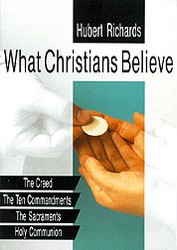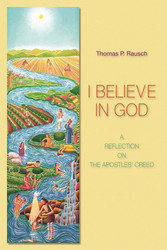What is faith? Is it a thing one has or a human activity? What is revelation? Is it a deposit of truths in the past or God’s action in the present?
These questions are addressed by renowned religious educator Gabriel Moran, who draws upon biblical and theological traditions set within today’s interreligious dialogue. A church of moral and liturgical activity in relation to a revealing God is the needed response to both a dismissal of religion and apocalyptic violence in its name. The future role of Christianity in the world and in individual lives may well hang in the balance: The Christian ideas of faith and revelation will either be the chief obstacle to dialogue with the contemporary world or else the main foundation to a Christian spiritual life that can give substance and direction to religious searching.
Product Preview
| Format: | Paperback book |
|---|---|
| Product code: | LP5388 |
| Dimensions: | 6" x 9" |
| Length: | 192 pages |
| Publisher: |
Liturgical Press
|
| ISBN: | 9780814653883 |
| 1-2 copies | $26.35 each |
|---|---|
| 3-9 copies | $25.15 each |
| 10-49 copies | $23.96 each |
| 50-99 copies | $23.36 each |
| 100+ copies | $22.46 each |
Praise
Believing in a Revealing God: The Basis of the Christian Life would make an ideal supplementary text for an undergraduate course in ecclesiology, because of its conversational style and invitation to discussion. Moreover, his focused and uncomplicated communication of what happened at Vatican II provides a reliable bridge for connecting young students to an event that might otherwise appear abstract and lost in the past. I would recommend this book for courses for religious educators and /or as the basis for discussion groups of religious educators.
This is a particularly valuable book in challenging contemporary thinking about faith and revelation and then following this through to implications for Christian spiritual life.
Believing in a Revealing God is a joyful book, charged with a love of creation and all creatures, one that though written from a Catholic perspective has considerable pertinence for other believers in a revealing God. This is, indeed, a landmark book. Don't miss it!
Gabriel Moran's book is a tour de force of practical theology. Beginning from a creative reappropriation of the meanings of `faith' and `revelation' as `believing in a revealing God,' Moran establishes a lively and relevant theological basis for addressing problems of authority and responsibility in the Church, for identifying the distinctively Christian faith-response to divine revelation, and for questions of teaching and learning. This remarkably stimulating and thoroughly original approach to our ecclesial life today offers real guidance through the perils and pitfalls of today's Christian believing. Written with a clarity and attractiveness that should give it a wide readership, the book charts its own distinctive course through some very well-traveled waters.
Once again Moran has shown he is one of the most underestimated Roman Catholic intellectuals of our time. No work is more timely. No project more important. The book is the summit of his life's work on the question of revelation. Moran's intention here is to be deeply conservative. He reclaims and restates wisdom from our Jewish and Christian past. His key question is: can the Christian church's tradition of profound ideas on revelation be made intelligible and relevant to today's problems and possibilities? Moran answers in the affirmative. However, everything depends on our interpretation of divine revelation. Moran's new work is our indispensable guide on this fundamental issue at this critical point in the twenty-first century.
Gabriel Moran, master-teacher, teaches us anew about old topics. He has fresh, insightful things to say about the God who reveals, the humans who accepts and responds to this revelation, and the community in which the revelation is mediated. When a master teacher speaks, there is always much to be learned by all who listen carefully, and that is abundantly true in this book.
Author
Gabriel Moran is a professor in the Department of Humanities and the Social Sciences at New York University. He is widely credited with reshaping the field of religious education in the United States and beyond. Moran is author of twenty books on religion and education, including Religious Education as a Second Language; Both Sides: The Story of Revelation and, most recently, Speaking of Teaching: Lessons from History.








